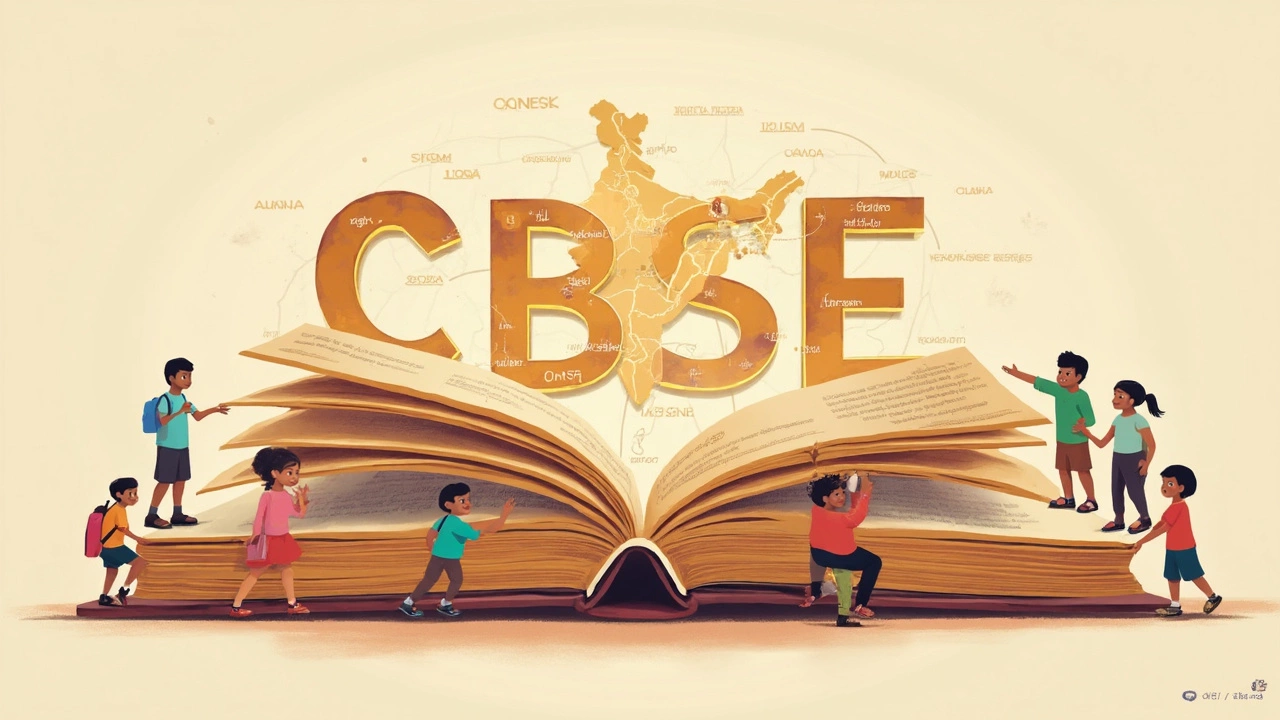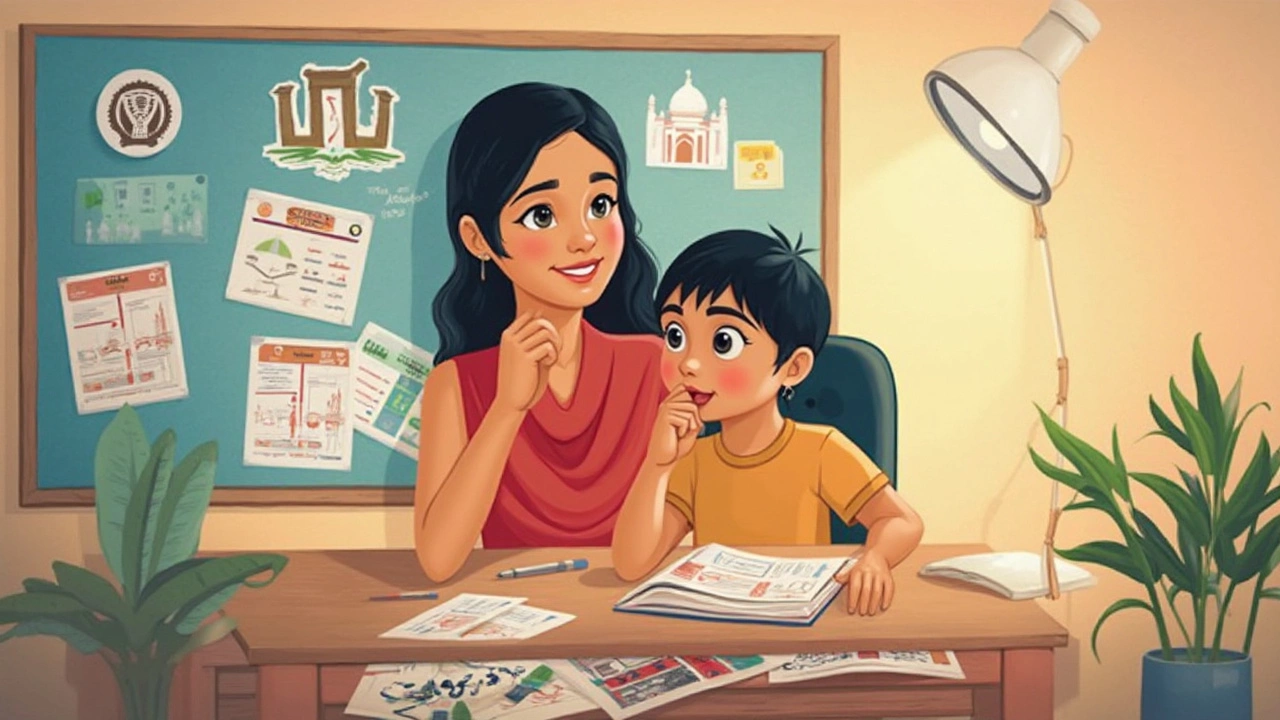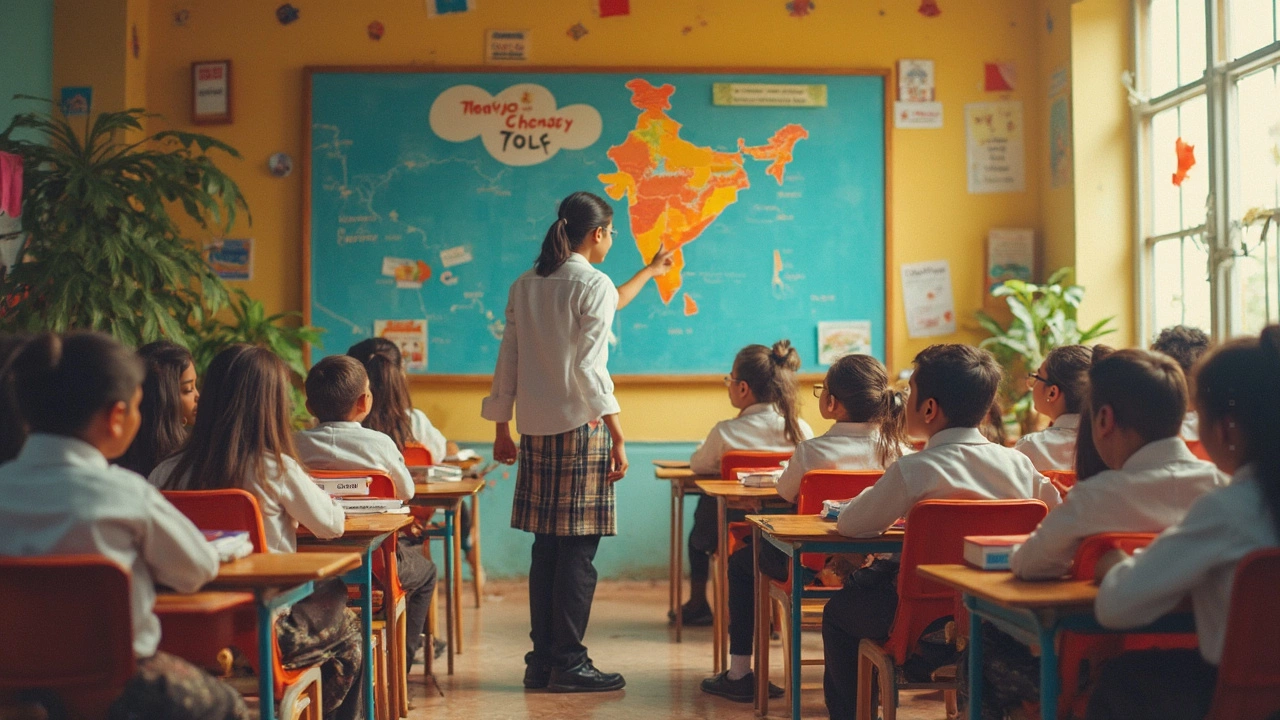Heard someone say CBSE is a ‘Delhi board’ and now you’re confused? You’re not alone. A lot of folks think CBSE belongs only to Delhi, or mainly makes decisions for schools there. But that’s not actually true, and knowing the real story can help if you’re picking schools or just trying to make sense of the education scene in India.
Let’s tackle the confusion right away: The Central Board of Secondary Education, or CBSE, isn’t just for Delhi. It’s a national education board, and you’ll find its schools in every state across India—and even abroad! So if you see ‘Delhi board’ scribbled online or hear it in a chat at a coffee shop, know that’s a leftover myth. But there’s a reason why this confusion started, and it’s kind of interesting when you hear the real details.
- What Is CBSE and Where Did It Start?
- Why Do People Call It the Delhi Board?
- How CBSE’s Syllabus Is Set Up
- CBSE vs State Boards: What’s Different?
- Choosing the Right Board for Your Child
What Is CBSE and Where Did It Start?
CBSE stands for the Central Board of Secondary Education. It's a board of education that sets rules and runs exams for schools across India. The cool thing? You’ll find CBSE schools in big cities, tiny towns, and even outside India—in places like Dubai and Singapore.
So, where did it all begin? CBSE didn’t just pop up overnight. The story starts in 1929. Back then, the colonial British government set up a board called the 'Board of High School and Intermediate Education, Rajputana.' This was supposed to cover provinces like Ajmer, Merwara, and more. In 1952, the current name—Central Board of Secondary Education—came in, and the board shifted its focus to create a single standard of education for students everywhere.
The headquarters of CBSE is in Delhi, but the board was designed to help provide centralized education guidance, not just for Delhi but for all of India. Today, more than 27,000 schools in India and about 240 schools abroad are linked to CBSE.
| Fact | Data |
|---|---|
| Year CBSE was formally set up | 1952 |
| Number of CBSE schools worldwide (2024) | ~27,000 in India, 240+ abroad |
| CBSE Headquarters | Delhi |
Why does this matter? CBSE’s roots in Delhi might explain why people sometimes call it the 'Delhi board', but actually, it’s a national board. No matter whether you live in Kerala or Kolkata, if your school follows CBSE, your syllabus and exams come from the same office in Delhi. That makes it a big deal for anyone looking to keep education consistent if they move around the country or switch cities.
Why Do People Call It the Delhi Board?
It’s a fair question: if CBSE is found in every corner of India, why do people still call it the ‘Delhi board’? It’s mostly about its roots. The Central Board of Secondary Education was first set up in 1929 as the Board of High School and Intermediate Education, but its real expansion happened after getting restructured in Delhi in the 1950s. The CBSE headquarters are in New Delhi, so major administrative decisions and big changes tend to get announced from there. That’s how the ‘Delhi board’ tag stuck, even though it’s not really accurate anymore.
For decades, all notices, updates, and exam changes would come directly from Delhi. Schools and students across India would wait for what seemed like the ‘final word’ streaming out of the capital. Here’s a little-known detail: before some big education reforms in the 1970s and 80s, most of the first CBSE-affiliated schools were in and around Delhi, especially government schools connected to central employees. So, families who moved often—like army or railway families—got used to the idea that if you wanted a reliable, transferable education, you signed up with a ‘Delhi board’ school, meaning CBSE.
Even now, people sometimes use ‘Delhi board’ as a nickname for CBSE, especially in regions where state boards are the norm. Here’s a quick look at why the association lingers:
- The board’s head office is solidly based in New Delhi.
- Big announcements and exam schedules typically originate from Delhi HQ.
- CBSE question paper setting and evaluation guidelines come straight from Delhi, then go to regional offices.
- Most policy decisions are first rolled out in Delhi before reaching the rest of the country.
Check this for a sense of how concentrated things started out:
| Year | CBSE Schools in Delhi | CBSE Schools Outside Delhi |
|---|---|---|
| 1970 | Approx. 100 | Less than 50 |
| 2025 | Over 1,000 | Over 26,000 |
The numbers make it clear: while the board’s reach exploded, old habits of calling it the ‘Delhi board’ took their sweet time to fade. So, if you ever catch someone calling CBSE the Delhi board, now you’ve got the full story.

How CBSE’s Syllabus Is Set Up
The CBSE syllabus isn’t made up on the fly or copied straight from some old curriculum. There’s actually a whole system behind it. The National Council of Educational Research and Training (NCERT) is the big boss for designing the books, lessons, and learning paths. So, if you’ve seen NCERT books in every CBSE school, that’s why. It’s basically the go-to source—that’s one reason parents like this board: same books from Delhi to Bengaluru.
The syllabus gets reviewed often. The folks at CBSE and NCERT tweak things based on new research and what’s practical for students. If something isn’t relevant anymore or a new idea pops up worldwide (like coding or financial education), you’ll see it pop up in the latest textbooks.
- Every few years, the syllabus is updated to match new trends and global standards.
- Subjects aren’t just dry theory—CBSE tries to toss in real-world stuff, so kids learn skills that matter outside the exam room.
- Exams are based strictly on the prescribed syllabus, so there’s less chance for weird surprises or out-of-syllabus questions.
Here’s a quick look at how the main subjects stack up in the CBSE curriculum:
| Subject | Main Focus Areas |
|---|---|
| Mathematics | Core concepts, problem-solving, logical thinking |
| Science | Concepts + lots of hands-on activities and experiments |
| Social Studies | History, Civics, Geography – focus on current life skills |
| English & Languages | Communication, comprehension, practical use |
| Optional Subjects | Computer Science, Artificial Intelligence, more trending courses |
The best part? The CBSE syllabus is the same no matter which city or town your school is in. You won’t need to hunt for special tutors if your family moves. Also, universities and colleges across India recognize the board’s credibility, so no headaches when it’s time to apply for admission later on.
CBSE vs State Boards: What’s Different?
This is a big one if your kid’s schooling is on your mind. What really makes CBSE different from your state board? It’s not one simple thing—it’s more like a bundle of differences, and understanding them can help you make smarter choices.
CBSE is a national board, run by the central government. State boards, as the name says, are managed by each individual state. This right here changes a bunch of things, from the textbooks used to the exams your child takes.
- Curriculum: CBSE follows the NCERT syllabus all over India, so a student who moves from Gujarat to Kerala won't fall behind. State boards use their own textbooks, sometimes updating at their own pace. If you travel or move for work, CBSE feels less disruptive for your child’s education.
- Language: CBSE mainly teaches in English and Hindi, while state boards often use the local language as the medium. This matters if you’re looking at college entrance exams later, as most of them in India follow the CBSE (or similar) curriculum and are in English or Hindi.
- Exam Style: CBSE sticks to more application-based questions, and it’s known for encouraging concept-based learning—great if your kid is prepping for national competitive exams like NEET, JEE, or even UPSC later on. State boards vary: some rely more on rote memorization or have different exam patterns.
- Transferability: With CBSE, you can transfer schools across states or even to other countries with less fuss. State boards mostly operate inside their own state borders.
- Result Trends: Pass percentages and grading systems differ. Some state boards give out higher marks more easily, affecting college admissions where cut-offs are a big deal.
If you’re a data-lover, here’s a quick snapshot of how CBSE stacks up against two random state boards based on 2024 Class 12 results:
| Board | Pass % | Core Exam Medium | Syllabus Base |
|---|---|---|---|
| CBSE | 87.98% | English/Hindi | NCERT |
| Maharashtra Board | 93.37% | Marathi/English | State-designed |
| Tamil Nadu Board | 94.56% | Tamil/English | State-designed |
So, CBSE isn’t always about higher pass rates, but it’s steady and recognized everywhere—which makes a difference if you’re thinking about long-term goals, like university or moving between cities.

Choosing the Right Board for Your Child
Picking between CBSE and other boards isn’t just about prestige or what your friends are doing. It really depends on what fits your family’s needs, your child’s style, and future goals. So, what makes CBSE stand out, and why might you pick it over other options?
- CBSE is accepted all over India and in many other countries. That’s a huge plus if your job means moving cities or even going abroad. The syllabus and exams stay mostly the same, so kids don’t have to relearn major chunks just because you moved.
- The CBSE syllabus focuses on foundation subjects like science and maths, which helps if your child wants to take national entrance exams like NEET or JEE. Those tests are directly based on the CBSE patterns.
- Most of India’s central government and Army schools follow CBSE. If you’re shifting between these schools (Kendriya Vidyalayas, Army Public Schools), CBSE makes switching easier and less stressful for kids.
But here’s the thing—not all children thrive in the same environment. Some kids love project-based learning or local studies, which State Boards or ICSE might support better. Check the subjects and teaching styles before you jump to a decision.
| Board | Curriculum Focus | Standardization | Popular For |
|---|---|---|---|
| CBSE | Science, Maths, Analytical Skills | High (national level) | Competitive Exams, Mobility |
| State Boards | Local Language, Regional Knowledge | Medium (state level) | Local Careers, Regional Colleges |
| ICSE | Language, Arts, Broad Variety | High (selected schools) | Holistic Coverage, Global Exposure |
Still stuck? Here are a few tips and questions to guide your decision:
- Think about your future plans. Will your child need to switch cities or go abroad for studies?
- Ask your child what subjects they enjoy. Some boards go deep into academics, others give more room for creative or practical work.
- Look at the school itself, not just the board. A good school with supportive teachers sometimes matters more than the choice between CBSE or State Board.
- If college entrance tests are already on your radar, remember: NEET and JEE follow CBSE content closely.
Don’t just copy what others pick—make sure it suits your family’s real situation. Trust me, families like mine have faced this crossroad and learned it’s really about what feels right, not just what sounds fancy.
